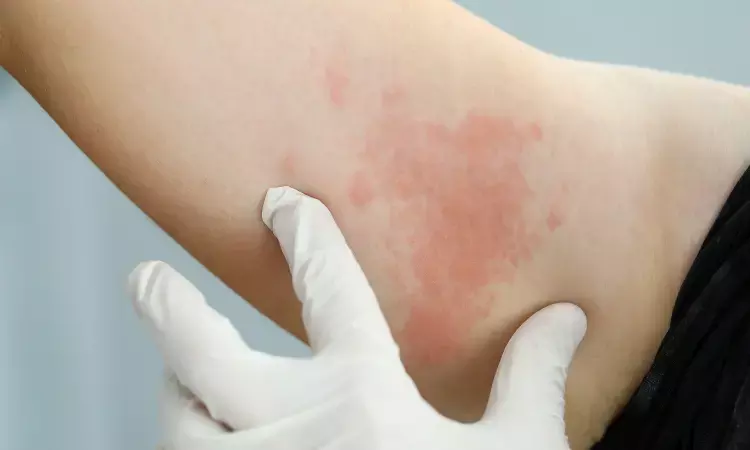- Home
- Medical news & Guidelines
- Anesthesiology
- Cardiology and CTVS
- Critical Care
- Dentistry
- Dermatology
- Diabetes and Endocrinology
- ENT
- Gastroenterology
- Medicine
- Nephrology
- Neurology
- Obstretics-Gynaecology
- Oncology
- Ophthalmology
- Orthopaedics
- Pediatrics-Neonatology
- Psychiatry
- Pulmonology
- Radiology
- Surgery
- Urology
- Laboratory Medicine
- Diet
- Nursing
- Paramedical
- Physiotherapy
- Health news
- Fact Check
- Bone Health Fact Check
- Brain Health Fact Check
- Cancer Related Fact Check
- Child Care Fact Check
- Dental and oral health fact check
- Diabetes and metabolic health fact check
- Diet and Nutrition Fact Check
- Eye and ENT Care Fact Check
- Fitness fact check
- Gut health fact check
- Heart health fact check
- Kidney health fact check
- Medical education fact check
- Men's health fact check
- Respiratory fact check
- Skin and hair care fact check
- Vaccine and Immunization fact check
- Women's health fact check
- AYUSH
- State News
- Andaman and Nicobar Islands
- Andhra Pradesh
- Arunachal Pradesh
- Assam
- Bihar
- Chandigarh
- Chattisgarh
- Dadra and Nagar Haveli
- Daman and Diu
- Delhi
- Goa
- Gujarat
- Haryana
- Himachal Pradesh
- Jammu & Kashmir
- Jharkhand
- Karnataka
- Kerala
- Ladakh
- Lakshadweep
- Madhya Pradesh
- Maharashtra
- Manipur
- Meghalaya
- Mizoram
- Nagaland
- Odisha
- Puducherry
- Punjab
- Rajasthan
- Sikkim
- Tamil Nadu
- Telangana
- Tripura
- Uttar Pradesh
- Uttrakhand
- West Bengal
- Medical Education
- Industry
Early Introduction of Allergenic Foods or probiotics Shields Against childhood Allergies

Shumin Wang and team found strategies to reduce the risk of allergic diseases in children by introducing certain foods early in life. According to a comprehensive study published in Advances in Nutrition, the timing of introducing complementary and allergenic foods plays a crucial role in influencing the development of allergies in children.
The study, which involved a thorough analysis of existing data, was conducted using a wide range of sources including the Cochrane Library, EMBASE, Web of Science, and PubMed. The researchers looked at the impact of introducing specific foods, including eggs and fish, at different ages on the risk of developing allergies, asthma, and atopic dermatitis in children.
One significant finding was that introducing eggs to children at or before six months of age may reduce the risk of food allergies in preschoolers under six years old. This early introduction appeared to have no effect on the development of asthma or atopic dermatitis.
Additionally, introducing fish between six and twelve months of age was associated with a decreased risk of asthma in children aged five to seventeen. Early introduction of allergenic foods to infants under six months of age, as opposed to later introduction, was found to be protective against the risk of atopic dermatitis in children under ten years old.
The study also highlighted the benefits of probiotic intervention for infants at high risk of allergic diseases. This intervention significantly reduced the risk of food allergies in children up to three years of age, asthma in those aged six to twelve, and atopic dermatitis in children aged under six.
Notably, the study did not find any association between early introduction of complementary foods or high-dose vitamin D supplementation during infancy and the risk of developing food allergies, asthma, or atopic dermatitis in childhood.
These findings provide valuable insights into how parents and caregivers can reduce the risk of allergic diseases in children. By introducing specific foods at the right time, particularly eggs and fish, and considering probiotic interventions for infants at high risk of allergies, families may be better equipped to protect their children from these health concerns.
Source:
Wang, S., Yin, P., Yu, L., Tian, F., Chen, W., & Zhai, Q. (2023). Effects of early diet on the prevalence of allergic disease in children: A systematic review and meta-analysis. Advances in Nutrition (Bethesda, Md.). https://doi.org/10.1016/j.advnut.2023.10.001
Neuroscience Masters graduate
Jacinthlyn Sylvia, a Neuroscience Master's graduate from Chennai has worked extensively in deciphering the neurobiology of cognition and motor control in aging. She also has spread-out exposure to Neurosurgery from her Bachelor’s. She is currently involved in active Neuro-Oncology research. She is an upcoming neuroscientist with a fiery passion for writing. Her news cover at Medical Dialogues feature recent discoveries and updates from the healthcare and biomedical research fields. She can be reached at editorial@medicaldialogues.in
Dr Kamal Kant Kohli-MBBS, DTCD- a chest specialist with more than 30 years of practice and a flair for writing clinical articles, Dr Kamal Kant Kohli joined Medical Dialogues as a Chief Editor of Medical News. Besides writing articles, as an editor, he proofreads and verifies all the medical content published on Medical Dialogues including those coming from journals, studies,medical conferences,guidelines etc. Email: drkohli@medicaldialogues.in. Contact no. 011-43720751


